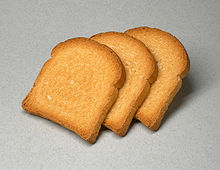- Rusk
-
For other uses, see Rusk (disambiguation).
A rusk is a hard, dry biscuit or a twice-baked bread. It is sometimes used as a baby teething food. In the United Kingdom, the name also refers to a wheat-based food additive.Contents
International variations
Germany
The zwieback (lit. baked twice) is a form of rusk eaten in Germany.
Greece
The term paximadi (Greek: παξιμάδι) covers various forms of Greek rusk, made commonly from barley or chickpea flour, and softened with wine, water or oil before eating. Paximadi form the basis of the Cretan snack dakos (Greek: ντάκος).
India, Pakistan and South Africa
In India, Pakistan and South Africa, rusk is a traditional dried bread (also "Khasta" in Hindi, and beskuit in Afrikaans) that is eaten after having been dipped in coffee, tea, or rooibos tea.[1] Historically, rusks evolved (along with biltong) during the latter country's early pioneering days as a way to preserve bread in the dry climate. It was also extensively used during times of war[2] or when traveling long distances.
Traditionally baked at home using a favourite bread recipe that is then dried under low heat, there are now several mass-market versions available, the most famous probably being Ouma Rusks. Many bakeries, delis and home industries sell them, often using more exotic ingredients than their mass-market counterparts. In addition to plain and buttermilk flavours, there are aniseed, wholewheat, condensed milk, muesli, and lemon poppyseed versions.
The humble rusk - whether an Ouma factory model or one of my mother's delicious home baked ones - is a South African icon, kant en klaar—T Coetzer, An ode to the rusk, Go! magazine, November 2009Italy
See biscotti.
Netherlands
Beschuit, also known as Dutch crispbakes, are light, round, rather crumbly, rusks as eaten in the Netherlands. It is customary to serve beschuit met muisjes (sprinkled with "little mice" which are anise seeds covered in white, pink or blue sugar) at the birth of a baby. Beschuit are also eaten as a breakfast food with a variety of toppings, most commonly butter and sprinkles in flavors like chocolate (chocoladehagel) or fruit(vruchtenhagel), or cheese. A longtime Dutch tradition is to serve strawberries on 'beschuit' usually topped with some sugar or whipped cream.
Beschuit is almost always sold in rolls; a roll typically has thirteen rusks (a baker's dozen). They are made by first baking a flat round bread (beschuitbol), slicing it, and then baking each half again, possibly at a lower heat, as in the oven after the main baking is over. Etymologically, biscotto (16c. Italian), biscuit (19th c., from 16th c. bisket) and beschuit come from L. (panis) bis+coctus, (bread) twice cooked. The South African beskuit (Afrikaans) tradition derives from beschuit.
Sweden
Skorpor are a Swedish form of rusk. Skorpor can be flavored with herbs, dried fruit, nuts, or spices such as anise or cardamom. Swedish bakery company Pågen makes the world's most sold rusk brand, Krisprolls.
United Kingdom
Butcher's rusk
To the British butcher rusk is a dry biscuit broken into particles, sorted by particle size and sold to butchers and others for use as a food additive in sausage manufacture.[3][4] Though originally made from stale bread, now called "Bread-rusk", a yeast-free variety called simply "Rusk" is now more commonly used.
Various rusk particle sizes are used in the food industry, where uses include:[5][6]
- A carrier for flavours, colours and seasonings
- A binding agent in hamburgers, sausages, stuffings, pies, and other compound meat products.
- As an ingredient for dried stuffing mixes.
Farley's Rusks
In the United Kingdom, Farley's Rusks are a dry biscuit dating from the 1880s but manufactured by Heinz since 1994. They are usually given to infants, soaked in milk and mashed up. They have a cult following among university students.[7]
In 2006 there was a short lived scare when it was found that some Farley's Rusks contained traces of the weedkiller chlorpropham. The affected products were recalled and the contamination was traced to a batch of flour used during the manufacturing process. The level of contamination was not high enough to be considered a health risk.[8]
Cake rusk
In the United Kingdom, a sweet quick bread marketed as cake rusk is sold in many foreign supermarkets and bakeries by imported brands such as Crispy (TWI Foods), and it is typically made from wheat flour, hydrogenated vegetable oil and/or margarine, sugar, baking powder or other raising agent, and flavouring, often in that order. It is sliced into bar-like strips and packaged in large plastic boxes.
See also
- Milk toast, some modern store-bought forms of which strongly resemble rusks with slight flavouring and sweeteners.
References
- ^ "What is Beskuit (Rusks)?". Rainbow Cooking. http://www.rainbowcooking.co.nz/rusks/what-is-beskuit. Retrieved 2008-11-09.
- ^ Hales, A. G.. "Campaign Pictures of the War in South Africa (1899-1900)". Project Gutenberg. http://www.gutenberg.org/files/16131/16131-h/16131-h.htm. Retrieved 2008-11-09.
- ^ "What's in the great British banger?". BBC News. September 27, 2002. http://news.bbc.co.uk/2/hi/uk_news/2284846.stm. Retrieved 2008-02-23.
- ^ "Labelling and Composition of Meat Products" (PDF). Food Standards Agency. April 22, 2004. http://www.food.gov.uk/multimedia/pdfs/meatproductguidancescot.pdf. Retrieved 2008-02-23.
- ^ "Rusk". Ripon Select Foods Limited. http://www.rsf.co.uk/p_rusk.html. Retrieved 2009-05-23.
- ^ "Cereal Binders and Stuffings". Lucas Products. February 4, 2005. http://www.lucas-ingredients.co.uk/cereals.htm. Retrieved 2008-02-24.
- ^ "Farley's Rusks live on, says Heinz". BBC News. June 4, 2003. http://news.bbc.co.uk/2/hi/uk_news/2964052.stm. Retrieved 2008-02-23.
- ^ "Farley's rusks withdrawn". Food Standards Agancy. 2006-02-02. http://www.food.gov.uk/news/newsarchive/2006/feb/farley. Retrieved 2008-11-09.
Categories:- Breads
- Biscuits (British style)
- South African cuisine
- Dutch cuisine
- Finnish cuisine
- Twice-baked goods
Wikimedia Foundation. 2010.


